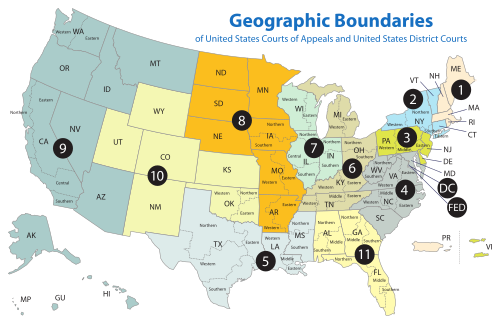Courts of Virginia include:
Contents
- State courts of Virginia
- Supreme Court of Virginia [1]
- Court of Appeals of Virginia [2]
- Virginia Circuit Court (120 courts divided among 31 judicial circuits) [3]
- Virginia General District Court (courts in 32 districts) [4]
- Virginia Juvenile and Domestic Relations District Court (courts in 32 districts) [5]
- Virginia Circuit Court (120 courts divided among 31 judicial circuits) [3]
The Virginia General District Court (GDC) is the lowest level of the Virginia court system, and is the court that most Virginians have contact with. The jurisdiction of the GDC is generally limited to traffic cases and other misdemeanors, civil cases involving amounts of under $25,000. There are 32 GDC districts, each having at least one judge, and each having a clerk of the court and a courthouse with courtroom facilities.
A Juvenile and Domestic Relations District Court, in Virginia, handles all cases involving juvenile crime, child abuse or child neglect, disputes involving custody and visitation, and other family-related matters, as well as cases in which a child or family member is an alleged victim. A judge hears all cases. Appeals from J&DR court go to Circuit Court.
- Court of Appeals of Virginia [2]

The Supreme Court of Virginia is the highest court in the Commonwealth of Virginia. It primarily hears direct appeals in civil cases from the trial-level city and county circuit courts, as well as the criminal law, family law and administrative law cases that are initially appealed to the Court of Appeals of Virginia. It is one of the oldest continuously active judicial bodies in the United States. It was known as the Supreme Court of Appeals until 1970, when it was renamed the Supreme Court of Virginia because it has original as well as appellate jurisdiction.
The Court of Appeals of Virginia, established January 1, 1985, is an eleven-judge body that hears appeals from decisions of Virginia's circuit courts and the Virginia Workers' Compensation Commission. The Court sits in panels of at least three judges, and sometimes hears cases en banc. Appeals from the Court of Appeals go to the Supreme Court of Virginia.
The Virginia Circuit Courts are the state trial courts of general jurisdiction in the Commonwealth of Virginia. The Circuit Courts have jurisdiction to hear civil and criminal cases. For civil cases, the courts have authority to try cases with an amount in controversy of more than $4,500 and have exclusive original jurisdiction over claims for more than $25,000. In criminal matters, the Circuit Courts are the trial courts for all felony charges and for misdemeanors originally charged there. The Circuit Courts also have appellate jurisdiction for any case from the Virginia General District Courts claiming more than $50, which are tried de novo in the Circuit Courts.
Federal courts located in Virginia
- United States Court of Appeals for the Fourth Circuit (headquartered in Richmond, having jurisdiction over the United States District Courts of Maryland, North Carolina, South Carolina, Virginia, and West Virginia)
- United States District Court for the Eastern District of Virginia [6]
- United States District Court for the Western District of Virginia [7]

The United States Court of Appeals for the Fourth Circuit is a federal court located in Richmond, Virginia, with appellate jurisdiction over the district courts in the following districts:

Richmond is the capital of the Commonwealth of Virginia in the United States. It is the center of the Richmond Metropolitan Statistical Area (MSA) and the Greater Richmond Region. Richmond was incorporated in 1742 and has been an independent city since 1871.

The United States District Court for the Eastern District of Virginia is one of two United States district courts serving the Commonwealth of Virginia. It has jurisdiction over the Northern Virginia, Hampton Roads, and Richmond metro areas and surrounding locations with courthouses located in Alexandria, Norfolk, Richmond and Newport News.
Former federal courts of Virginia
- United States District Court for the District of Virginia (extinct, subdivided)
- United States District Court for the District of Potomac (1801-1802; also contained the District of Columbia and pieces of Maryland; extinct, reorganized) [8]
The United States District Court for the District of Potomac was a short-lived United States federal court. Named for the Potomac River, it had jurisdiction over the District of Columbia and pieces of Maryland and Virginia, making it the first United States district courts to cross state lines. It was established in the Judiciary Act of 1801 – also known as the "Midnight Judges Act", because it sought to redistrict the federal courts to allow outgoing President John Adams to make additional appointments – and was abolished in the Judiciary Act of 1802. The language of the first Judiciary Act, setting forth the geographic jurisdiction of the District, was as follows:
And a new district shall be established, in the districts of Maryland and Virginia, to consist of the territory of Columbia, of all that part of the district of Maryland, which lies west and southwest of the river Patuxent, and of the western branch thereof, and south of the line which divides the county of Montgomery in the last mentioned district, from the county of Frederick, and of a line to be drawn from the termination of the last mentioned line, a northeast course to the western branch of the Patuxent; and of all that part of the district of Virginia, which lies north of the river Rappahannock, and east of the line which divides the counties of Fauquier and Loudon, in the last mentioned district from the counties of Fairfax, Prince William, and Stafford; which new district shall be called the district of Potomac, and a district court in and for the same, shall be holden at Alexandria, by the district judge of the district of Maryland, on the first Tuesday in April, and the first Tuesday in October, in each and every year.







